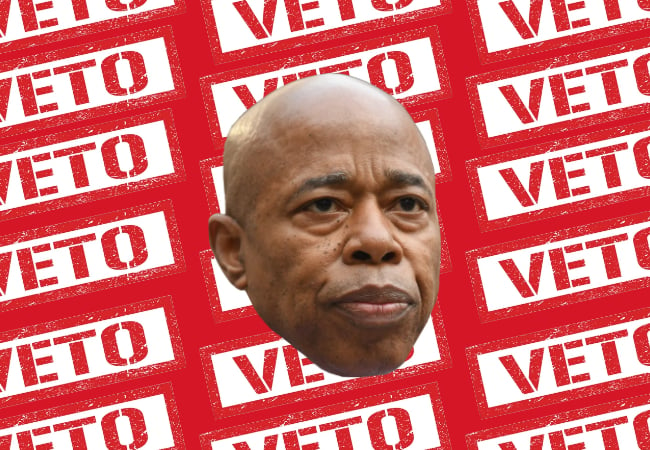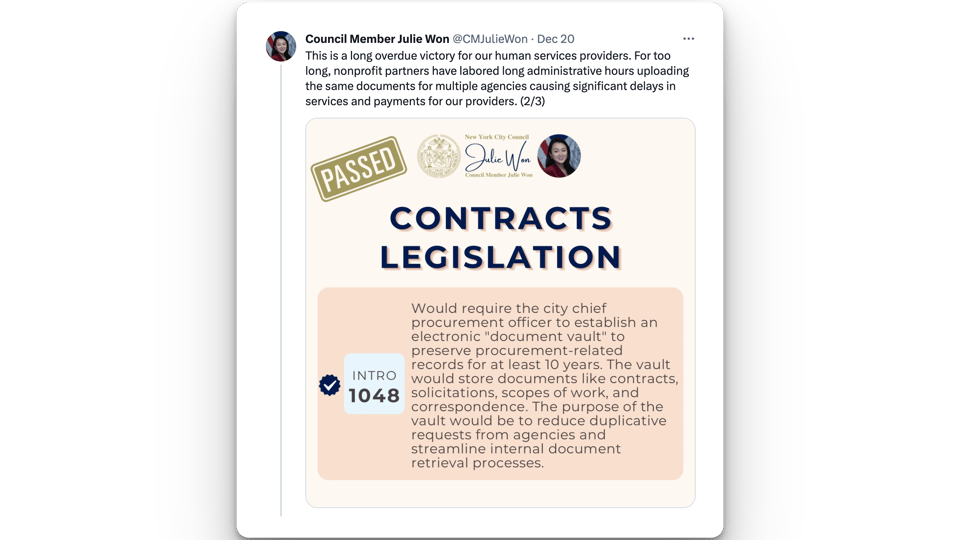Coastal Waters, NYPD, NYC's Overdue Payments
Merry Christmas!
This is the third issue of Keys to the City Council.
Please keep sending me your feedback! It's been helpful to me and I love hearing from you. If you like the newsletter, please share it with folks.
There will be no council meetings this coming week.
Stay tuned for a New Year's Day issue covering how the council works, how to navigate the information they put out, and directions this newsletter might go.
- Vikram
Last week marked the end of the council's legislative session. The next session starts on January 3rd, 2024 and features a freshly-elected council body.
Legislation passes every 2 weeks in NYC.
Last week the council passed over 50 bills.
Here is some of the smaller fun, unexpected, or interesting legislation that passed last week.
Legislative Snacks

Ads are allowed in all for-hire vehicles now.
Introduction 1139 lets any for-hire vehicle, not just yellow cabs, install interior tablets to advertise to passengers.
This evens the playing field:
- Every driver can partake in 25% of ad revenue, not just yellow cab drivers.
- Every ride -- not just yellow cab rides -- will be more annoying.
You can bring your Nalgene bottle to a ball game.
Introduction 1161 requires that sports venues allow folks to bring in reusable beverage containers.
Now you can:
- Stay hydrated without paying an arm and a leg for a plastic bottle of water.
- Not throw away that plastic bottle.
Venues can require these bottles to be empty so it is unlikely that you will be able to sneak in a Nalgene of vodka.
Toward a future where fewer ships discharge poop sewage in NYC's coastal waters
The seafaring among us might know about "no discharge zones" (NDZs), which are waters where vessels are prohibited from discharging sewage.
From a committee report:
Currently, the bodies of water [in NYC] with an NDZ designation are the portions of the Hudson River and Long Island Sound within New York State, as well as Jamaica Bay.
Introduction 532 requires the Department of Environmental Protection (DEP) to install at least two pumpout facilities yearly so vessels can pump out their sewage instead of dumping it into our waters.
Pumpout facilities are required for the federal government to designate waterways as NDZs, a designation NY state aims to win for all its coastal waterways.
Legislative Highlights
Mayor Adams is expected to veto two bills that passed last week: one banning limiting the use of solitary confinement and another requiring NYPD to report on every police-civilian stop.
NYPD transparency legislation passed by the city council goes well beyond the bills getting media coverage: we should expect a lot of new public data about NYPD next year.
I want to talk about those bills as well as a couple of other highlights from last week, including some legislation that didn't make it to the floor.

The two bills Mayor Adams is likely to veto
Introduction 549-A limits the use of solitary confinement to "de-escalation confinement".
De-escalation confinement is a form of solitary confinement. But it is specifically defined to follow incidents where an individual has caused (or risks causing) physical injury. It requires:
- More humane living standards.
- A limit of 4 hours a day and 12 hours a week.
- Regular monitoring by staff.
Introduction 586 is the "How Many Stops Act". It is part of a larger NYPD transparency package and it requires reporting on every police encounter, not only "level 3" or "reasonable suspicion" stops. Reporting requirements include:
- Categorizing interactions based on the intensity of police suspicion.
- Demographic and outcome details, including data on the race, gender, age of civilians involved, and specifics on summonses, arrests, or use of force.
- Regular, transparent updates, including quarterly reporting that is accessible online.

A slate of bills boosting NYPD transparency
The NYPD transparency package goes well beyond the How Many Stops Act.
All reporting requirement have quarterly public reporting requirements attached to them.
- Large donations: Introduction 638A requires an annual report on donors who donate more than $1MM to NYPD within a year. It also requires reporting on where the money went.
- Body camera footage: Introduction 585 requires NYPD to share body camera footage with the Department of Investigation within 10 days of receiving a request for footage.
- Overtime spending, stop-question-and-frisk: Introduction 948-A expands reporting for a bunch of data, including use of overtime and stop-question-and-frisk. Most of it will have to be posted on NYPD's website.
- Vehicle stops: Introduction 781 requires officers to report on the justification for vehicle stops, including whether the offense is an infraction, violation, misdemeanor, or felony.
- Search requests: Introduction 538A requires officers to report on instances they ask individuals to consent to a search, circumstances involved in their request, and any denials of consent.

Helping formerly incarcerated individuals
Introduction 1203-A requires the Department of Corrections (DOC) to provide discharge papers to individuals at the time of their release.
People need proof of release to regain public benefits like Social Security and Medicaid. By getting discharge papers on release, they don't have to make requests to the DOC after they are released.
Introduction 632-A prohibits housing discrimination on the basis of criminal history.
The "Fair Chance for Housing Act" prohibits landlords, owners, agents, employees, and brokers from accessing information about applicants' criminal history, with exceptions:
- Sex offenses, misdemeanors less than 3 years old, and felonies less than 5 years old are "reviewable".
- Small, owner-occupied housing may review all of an applicant's criminal history.
- Convictions for actions related to reproductive or gender-affirming care, or cannabis possession that doesn't constitute a felony in New York are not reviewable.
Applicants must be informed of a criminal background check along with any findings, and may submit explanations.

NYC's government regularly fails to pay contractors on time.
Non-profit and human services contractors for the city, often serving vulnerable populations, get paid very late.
They've reported taking loans to cover expenses while awaiting payment. They then spend money on interest instead of resources to render their services.
From a report coming out of the Committee on Contracts:
... the median cycle time for vendor payments to non-profit or human service providers was 624 days, substantially longer than the citywide median cycle time of 595 days.
... Nonprofit providers routinely report relying heavily on loans and lines of credit to cover expenses while awaiting reimbursement on City contracts.
... Human service nonprofits report having to rely on credit to cover gaps ... for an average annual cost of interest of $223,000
To combat this problem, Introduction 1048 passed last week. It tackles bureaucratic inefficiency, requiring a central document vault so that vendors can upload documents once, instead of multiple times for each city agency they work with.
1048 is a basic, important improvement. Vendors apparently labor hundreds of hours to complete and submit virtually identical paperwork in different ways for different agencies. They won't have to soon.
But this late payments issue goes well beyond inefficiency: right now, these contractors are forced to take loans to remain in operation and then pay the interest themselves. The city does not make them whole.

Another bill, Introduction 982, requires the city to pay interest on late payments to these providers.
982 has been under consideration alongside 1048, but it was not on the agenda for last week's vote.
So there is no accountability if NYC does not pay these contractors on time. But at least 1048 saves them some time uploading documents.
Comments? Suggestions? Want to hear more about something? I use AI to sift through bills and hearings and I'm happy to poke around.
You can send an email to voberoi@gmail.com or reply to this email.